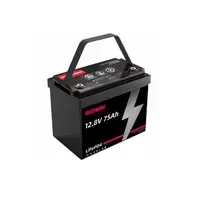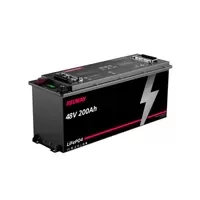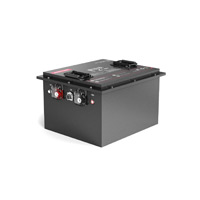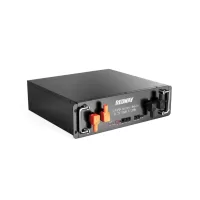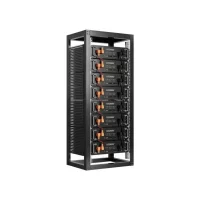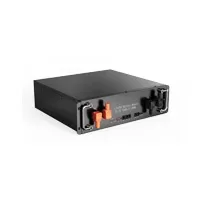Welcome to our blog post on LiFePO4 batteries and the importance of Battery Management Systems (BMS)! If you’re in the market for a reliable and long-lasting battery solution, then you’ve come to the right place. LiFePO4 batteries have gained popularity in recent years due to their impressive performance and safety features. However, it’s essential to understand why these batteries require a BMS for optimal functionality. In this article, we will delve into the world of LiFePO4 batteries, explore the role of BMS, debunk some common misconceptions, provide tips on choosing the right BMS for your battery needs, and much more. So let’s dive in!
The Importance of Battery Management Systems (BMS)
Battery Management Systems (BMS) play a crucial role in ensuring the optimal performance and longevity of LiFePO4 batteries. These advanced systems are designed to monitor, control, and protect the battery pack from various potential issues that can arise during charging and discharging processes.
One of the key reasons why BMS is so important is its ability to balance cell voltages. LiFePO4 batteries consist of multiple cells connected in series or parallel configurations. Over time, these cells can experience slight variations in voltage due to manufacturing tolerances or differences in capacity degradation. A BMS actively monitors each cell’s voltage and ensures that they stay within safe limits by redistributing energy among them.
In addition to balancing voltages, a BMS also regulates charging and discharging currents. It prevents overcharging by controlling the charge rate as the battery nears full capacity, preventing damage to individual cells or even explosions. Similarly, it limits discharge rates to prevent excessive strain on the battery pack during high-demand situations.
Furthermore, a BMS provides vital protection against overheating and thermal runaway events. By continuously monitoring temperature levels within the battery pack, it can trigger safety measures such as reducing current flow or shutting down operations altogether if temperatures exceed safe thresholds.
Moreover, a well-designed BMS incorporates features like short-circuit protection and over-current detection mechanisms that safeguard against electrical faults or accidents caused by external factors.
Investing in a reliable BMS for your LiFePO4 batteries is essential for maximizing their efficiency while minimizing risks associated with improper usage or maintenance practices. With its ability to balance cell voltages, regulate currents, protect against thermal events, and provide additional safety measures – a robust BMS acts as an indispensable guardian for your valuable energy storage system.
How a BMS works for LiFePO4 batteries
A Battery Management System (BMS) is a crucial component when it comes to LiFePO4 batteries. But how exactly does it work? Let’s dive into the details.
First and foremost, a BMS acts as the brain of your battery system. It constantly monitors various parameters such as voltage, current, and temperature. This real-time monitoring ensures that your battery operates within safe limits.
One of the key functions of a BMS is cell balancing. LiFePO4 batteries consist of multiple cells connected in series or parallel configurations. Over time, these cells may experience slight variations in performance due to factors like manufacturing tolerances or aging. A BMS helps equalize the charge across all cells, preventing overcharging or undercharging of individual cells.
Another important feature is protection against overvoltage and undervoltage conditions. If the voltage exceeds or drops below certain thresholds, the BMS will take action to prevent damage to the battery pack or connected devices.
The BMS also plays a crucial role in protecting against excessive discharge currents that could lead to overheating or even thermal runaway. By continuously monitoring current flow, it can limit discharge rates if necessary.
Furthermore, many advanced BMS systems offer communication capabilities through protocols like CANbus or RS485. This allows for remote monitoring and control of multiple batteries in larger energy storage systems.
A well-designed BMS ensures optimal performance and longevity of your LiFePO4 battery by actively managing its operation and protecting against potential hazards associated with lithium-ion chemistry.
Remember – investing in a reliable BMS is an essential step towards maximizing the efficiency and safety of your LiFePO4 battery system!
Benefits of using a BMS for LiFePO4 batteries
Benefits of using a BMS for LiFePO4 batteries
LiFePO4 batteries have gained popularity in various industries due to their superior performance and safety features. However, to ensure optimal performance and extend the lifespan of these batteries, it is crucial to incorporate a Battery Management System (BMS) into the setup.
One of the key benefits of using a BMS is enhanced safety. LiFePO4 batteries can be prone to certain issues such as overcharging, over-discharging, and overheating. A BMS monitors important parameters like voltage, current, and temperature, ensuring that the battery operates within safe limits at all times.
Additionally, a BMS helps maximize efficiency by balancing individual cells within the battery pack. This prevents any one cell from becoming overcharged or undercharged compared to others. By maintaining balanced cell voltages throughout discharge cycles, you can optimize energy utilization and overall capacity.
Another advantage is improved longevity. The BMS actively manages charging and discharging processes while also preventing deep discharge or excessive charge levels that can significantly degrade battery life. With proper management provided by a BMS, your LiFePO4 battery will last longer and deliver consistent performance over its lifetime.
Furthermore, a BMS provides valuable monitoring capabilities. It allows you to access real-time data on important metrics such as state-of-charge (SOC), state-of-health (SOH), remaining capacity, and more. This information empowers you with insights into your battery’s condition so you can make informed decisions regarding maintenance or replacement needs.
Lastly yet importantly another benefit is compatibility with other systems in your application setup. A well-designed BMS integrates seamlessly with other components like inverters or solar chargers used alongside LiFePO4 batteries. This ensures efficient coordination between different elements of your power system while maximizing both performance and safety.
In conclusion,
a Battery Management System brings numerous benefits when used in conjunction with LiFePO4 batteries.
From enhanced safety and efficiency to improved longevity and advanced monitoring capabilities, a BMS
Common misconceptions about BMS for LiFePO4 batteries
Common misconceptions about BMS for LiFePO4 batteries
1. “BMS is unnecessary for LiFePO4 batteries.”
One common misconception is that LiFePO4 batteries do not require a Battery Management System (BMS) because they are considered to be inherently safe. While it is true that LiFePO4 batteries have a lower risk of thermal runaway compared to other lithium-ion chemistries, they still benefit greatly from the protection offered by a BMS.
2. “LiFePO4 batteries can self-regulate their charge and discharge cycles.”
Another misconception is that LiFePO4 batteries can manage their own charging and discharging without the need for a BMS. While these batteries are more stable than other lithium-ion chemistries, they still require monitoring and control to ensure optimal performance and longevity.
3. “All BMS systems are created equal.”
Not all BMS systems are created equal, and choosing the right one for your LiFePO4 battery is crucial. Some cheaper or generic BMS options may lack important features such as cell balancing, temperature monitoring, or overcurrent protection. It’s essential to select a high-quality BMS that suits the specific requirements of your battery system.
4. “A basic charger can replace the functions of a BMS.”
Some people mistakenly believe that using a basic charger with built-in voltage limits will provide sufficient protection for their LiFePO4 battery pack. However, without an advanced BMS in place, you may miss out on critical functions like individual cell monitoring, balancing, and protection against overcharging or over-discharging.
5. “Once installed, there’s no need to monitor or maintain the BMS.”
While having a reliable BMS provides peace of mind when it comes to managing your LiFePO4 battery system’s health and safety aspects – it does not mean you should neglect regular monitoring and maintenance tasks associated with your particular setup. It is always wise to periodically check the BMS performance and ensure it is
Tips for choosing the right BMS for your LiFePO4 battery
Tips for choosing the right BMS for your LiFePO4 battery:
1. Consider the capacity: The first step in selecting a suitable BMS for your LiFePO4 battery is to determine its capacity. Different batteries have different power requirements, so it’s important to choose a BMS that can handle the specific needs of your battery.
2. Look for voltage compatibility: LiFePO4 batteries operate at a nominal voltage of 3.2 volts per cell, so make sure the BMS you choose is designed to work with this voltage range. Using an incompatible BMS could lead to improper charging or discharging, which can shorten the lifespan of your battery.
3. Check for temperature monitoring: LiFePO4 batteries are sensitive to extreme temperatures, so opt for a BMS that includes temperature monitoring capabilities. This will help prevent overheating and ensure optimal performance and longevity.
4. Assess communication features: A good BMS should have effective communication interfaces such as CAN bus or RS485 protocols, allowing you to monitor and control your battery system remotely. This enables real-time data collection and analysis, facilitating better management of your LiFePO4 battery.
5. Consider safety features: Safety should be a top priority when choosing a BMS for any type of lithium-ion battery, including LiFePO4 batteries. Look out for features such as overcharge protection, short circuit protection, and thermal runaway prevention mechanisms.
6. Evaluate reliability and durability: Choose a reputable brand known for producing reliable and durable products that can withstand harsh environmental conditions like vibrations or moisture exposure if needed in certain applications.
Remember these tips while searching for the most suitable Battery Management System (BMS) for your specific LiFePO4 battery requirements!
Conclusion
Conclusion
Battery Management Systems (BMS) play a crucial role in ensuring the optimal performance and safety of LiFePO4 batteries. These advanced systems provide vital functions such as monitoring, balancing, and protecting the battery cells.
By constantly monitoring voltage levels, temperature, and other parameters, a BMS can prevent overcharging or over-discharging of LiFePO4 batteries. This helps to extend their lifespan and maximize their overall capacity.
Additionally, a BMS ensures that each individual cell within the battery pack is balanced. This means that all cells are charged and discharged evenly, preventing any imbalances that could lead to reduced performance or even damage to the battery.
One of the key benefits of using a BMS for LiFePO4 batteries is enhanced safety. The BMS actively protects against potential risks such as short circuits, excessive current draw, or overheating. It provides peace of mind knowing that your battery system is being closely monitored and controlled.
Despite some misconceptions about cost or complexity associated with implementing a BMS for LiFePO4 batteries, it is important not to overlook its long-term advantages. Investing in a quality BMS can ultimately save you money by prolonging battery life and preventing costly repairs or replacements.
When choosing a BMS for your LiFePO4 battery system, consider factors like compatibility with your specific application requirements and scalability for future expansion. Look for reputable manufacturers who offer reliable products backed by warranties and good customer support.
If you want to get the most out of your LiFePO4 batteries in terms of performance efficiency and longevity while ensuring safety at all times – investing in a high-quality Battery Management System (BMS) is essential! Don’t underestimate the power of this technology to optimize your energy storage solutions!


